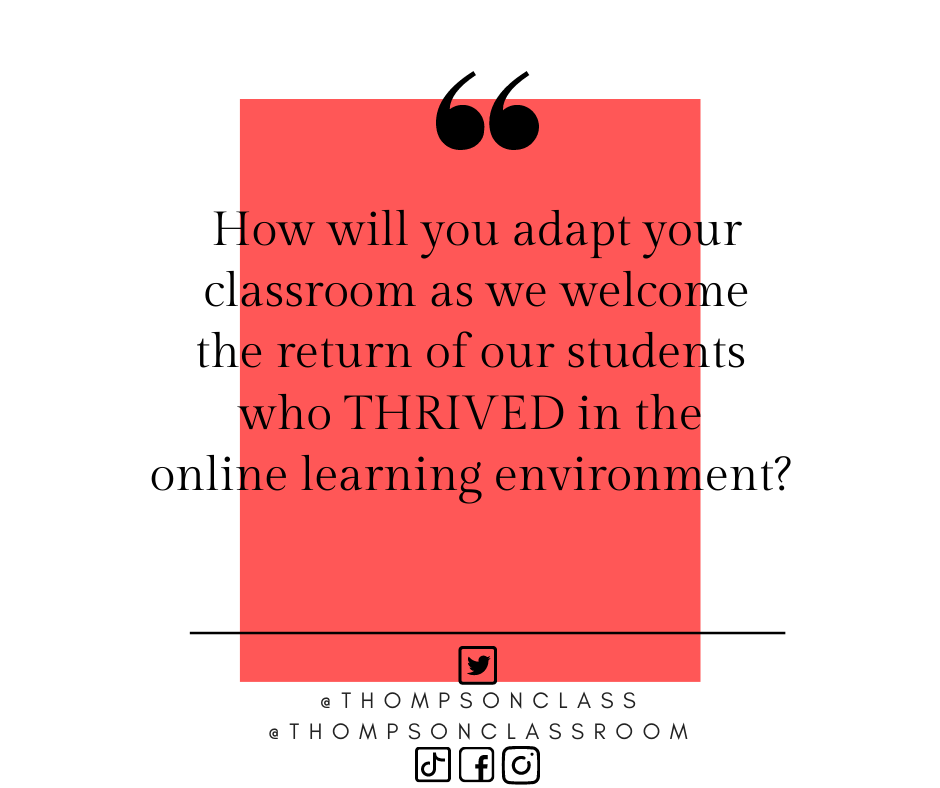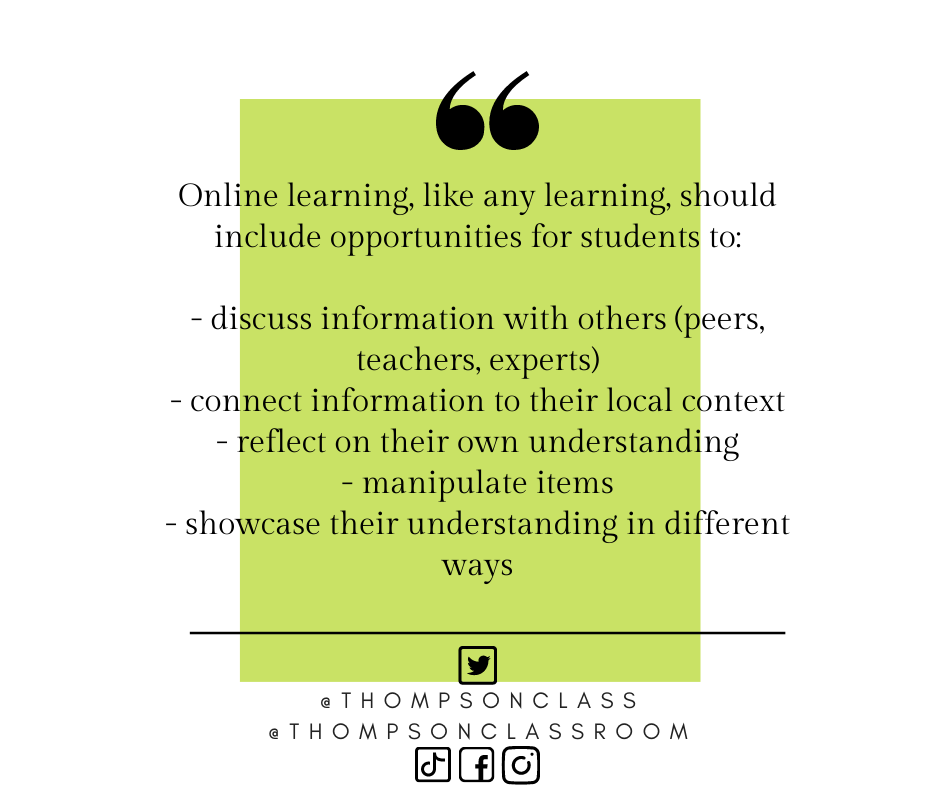Every Monday I share a different ed tech quote on our Thompson Classroom social media pages for our staff to consider. Here in Manitoba it has been a full week since we welcomed the vast majority of our students back to our buildings following a period of temporary remote learning which ended on January 15th. While we continue to have some of our learners enrolled in remote learning as a result of medical accommodations or logistical constraints, almost all of our learners are now attending in-person. While this has been celebrated by many stakeholders we can’t ignore that, for those with access,… Read More
Mantra Monday
Every Monday I share a different ed tech quote on our Thompson Classroom social media pages for our staff to consider. This week’s Mantra is: As I work with educators I am finding that it can be easy to get hyper-fixated on a particular tool (Teams, Seesaw, Forms, etc). This focus can create a tunnel-vision where educators are only seeing the features of that particular tool and end up designing their lessons around that tool rather than focusing on pedagogy and how particular tools can help address their learning goals. Even though our teaching environment may shift from the classroom to student… Read More
Philosophical & Cognitive Foundations of an ICT Curriculum
One of our projects this semester is to develop components of a curriculum within a group setting. I am very lucky because my partner is not only interested in technology as well but also lives in our area and is already a good friend of mine; lucky me! 🙂 We have been working on a middle-years Digital Literacy curriculum that is designed to be implemented cross-curricularly. If you read my previous post you know that a big chunk of our class has been spent on the theory behind strong curriculum development. As such, this is our theoretical foundations for our… Read More
Indigenizing the Curriculum
As professionals tasked with the education of Canadian youth, educators require understanding of First Nations, Metis, and Inuit practices, in order to effectively apply appropriate pedagogy within their classrooms. Deyhle, Swisher, Stevens, and Galvan (2008, p. 344) illustrate the process in which Indigenous peoples of North America have fought towards building an educational model that addresses the biases found in current models and strives to reshape education from an epistemological perspective. The authors’ lament over the multiple instances of cultural genocide through post-colonial education systems and call for a shift to self-determination in Indigenous education (Deyhle et al,… Read More
How Does Theory Help Curriculum Development?
The curriculum development process can be organized into four, seven, or more steps depending on which model and theorist the development plan is based on (Ornstein & Hunkins, 2013, pg. 13). Regardless of the model that is chosen, curricularists need to recognize that curriculum development is a lengthy process that requires professionals to make judgements to best serve the social and political realities of their situation while meeting the needs of a diverse group of learners (Ornstein & Hunkins, 2013, pg. 13). A strong theoretical background is essential for curricularist to ensure that their curriculum development is backed by the… Read More
Further Thoughts on the Education Paradigm
*This post has been written as part of my journey through my Master’s Degree in Curriculum & Planning through Brandon University Changing the Education Paradigm. (2008) Uploaded to TED. Availble onine at: https://www.ted.com/talks/ken_robinson_changing_education_paradigms Sir Kenneth Robinson’s speech, “Changing the Education Paradigm” has recorded over 1.6 million views through the TED platform and countless more through the various versions uploaded online through text and video platforms. The video is viewed by everyone from pre-service teachers and educational PD attendees to parents and businessmen/women around the world. The graphics of the video and charisma of Robinson make for an engaging video that… Read More
Foundational Understandings: Curriculum, Instruction, Theory & Practice
*This post has been written as part of my journey through my Master’s Degree in Curriculum & Planning through Brandon University. Can you differentiate between curriculum and instruction? Levin (2008) stated that “curriculum is an official statement of what students are expected to do”. This changes depending on the subject manner, grade level, and abilities of the student(s). Instruction is how an educator assists students in their journey towards understanding. Levin, B. (2008). Curriculum policy and the politics of what should be learned in schools. In M. Connelly, F.M. He, & J. Phillion (Eds.). The SAGE handbook of curriculum and instruction. Thousand… Read More
Changing the Education Paradigm…. But How?
*This post has been written as part of my journey through my Master’s Degree in Curriculum & Planning through Brandon University. Changing the Education Paradigm. (2008) Uploaded to TED. Availble onine at: https://www.ted.com/talks/ken_robinson_changing_education_paradigms Sir Kenneth Robinson’s speech, “Changing the Education Paradigm” has recorded over 1.6 million views through the TED platform and countless more through the various versions uploaded online through text and video platforms. The video is viewed by everyone from pre-service teachers and educational PD attendees to parents and businessmen/women around the world. The graphics of the video and charisma of Robinson make for an engaging… Read More
Curriculum Controversy – Discovery Math Isn’t Adding Up
*This post has been written as part of my journey through my Master’s Degree in Curriculum & Planning through Brandon University. In 2013 Manitoba Education Minister Nancy Allen announced the implementation of a revised math curriculum that focused on, “… developing math skills, procedural thinking, conceptual understanding and problem solving to ensure students are getting a solid foundation” (Manitoba Education Press Release, 2013). The curriculum shifted from an inquiry-based approach, often touted in the media as “discovery math”, to an algorithm approach that focuses on deep-level numerical understanding. Levin (2008, p. 11) stated that, “5% of clients complaining can lead to… Read More
Our Curriculum Situation in 150 Words
On Saturday I shared my Curriculum Situation that I created for my Introduction to Curriculum class that I am currently enrolled in. While the entry that I created was specific for me, the assignment itself was collaborative and we were tasked with merging our situation with those of two other students in order to create one complete Curriculum Situation that we felt accurately represented us as a group. To complete this task we each created our own situations, like the one I shared, and then went through to determine where our similarities and differences laid. Once… Read More

